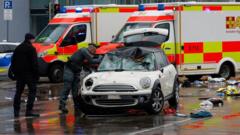At approximately 10:30 a.m. local time on Thursday, chaos erupted as a car was driven into a crowd gathered for a transport workers' union rally in Munich, injuring at least 30 individuals, some in critical condition. Authorities report that the driver, identified as a 24-year-old Afghan asylum seeker named Farhad N., was immediately detained at the scene. The situation triggered a rapid response from emergency services, including helicopters, as police were forced to shoot at the vehicle before apprehending the suspect.
This incident raises significant concerns amid a series of violent attacks in Germany, recently linked to immigration issues. In light of the event, Chancellor Olaf Scholz condemned the attack, asserting that the perpetrator must face substantial consequences and be expelled from the country. The timing of the attack is particularly sensitive, occurring just days before the Munich Security Conference, which is set to host critical global leaders.
Eyewitness accounts describe panic as people fled for safety in nearby shops and residential buildings. One student remarked on the unsettling atmosphere, struggling to maintain focus following the distressing episode. Munich's Mayor, Dieter Reiter, noted that children were among those injured, emphasizing the harrowing nature of the attack.
Investigations are currently led by counter-terrorism units, searching for possible extremist motivations behind the driver's actions. Media reports indicate that the suspect arrived in Germany as a minor in 2016 but had his asylum request denied the following year and was subject to deportation orders in late 2020, which were not executed due to security conditions in his home country.
As Germany braces for its federal elections on February 23, immigration policy has once again taken center stage. Bavaria's Premier, Markus Söder, called the incident a wake-up call for immediate reforms, echoing sentiments expressed in the aftermath of previous attacks that have instigated broader discussions about national security and immigration.
Within the past few months, the nation has witnessed several violent episodes, with increasing scrutiny on foreign nationals involved. Political tensions have intensified, particularly rising support for the far-right Alternative for Germany (AfD) party, which advocates for stricter immigration policies. Scholz has indicated a commitment to accelerate deportations of high-risk criminals back to Afghanistan, a move that signals a shift in governmental stance leading up to the elections.
As investigations continue, police have invited witnesses to come forward with information as they work to establish whether others were involved in the attack. The Munich police are under pressure to ensure security as unsettling parallels to past tragedies remain fresh in the public's memory.


















